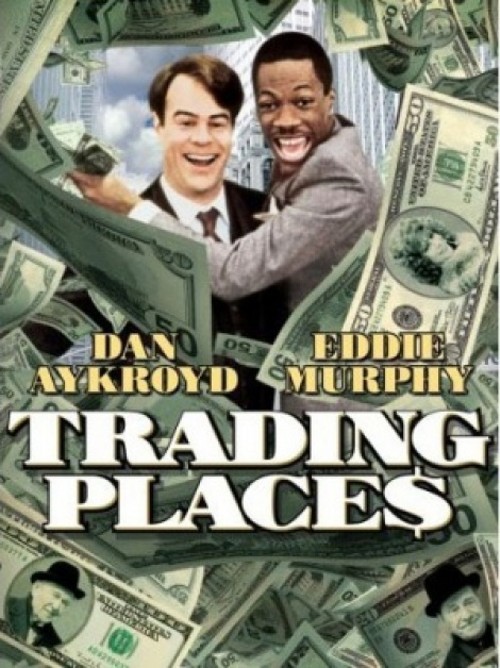%uFFFD
Which is perhaps as it should be. When even Wall Street movers and shakers don’t seem to grasp the enormous danger they’ve put the world in (why can’t anyone adequately explain what “credit default swaps” are?), it’s tough to make such things comprehensible to even sophisticated art-house audiences, never mind those who just want some blow-’em-up action. As one wag on the Internet put it in late 2008, when it looked as if the financial crisis would end with us all in bread lines, “If civilization collapses over credit default swaps” instead of zombies, giant asteroid or ape uprising, “I am going to be pissed.” It’s tough to make high finance cool, even when it is destroying the planet.
There are some great movies that do use high finance as plot points, and sometimes the incomprehensibility of it can serve as a source of humor, as in Trading Places, with its underlying joke implying that Eddie Murphy’s street hustler is no worse a businessman than broker Dan Aykroyd. It works, too, in 1988’s Midnight Run—surely one of the funniest movies ever made—in which Charles Grodin is a nice, nerdy accountant on the run from the mafia after he embezzles millions from a mob boss. Here, a source of one running joke is who, really, is the bad guy in this situation.
Will Ferrell has, purely coincidentally, recently portrayed two accountant types whose mildmannered-ness and dedication to numeric detail are at odds with the loud raucousness we expect from comedy: In 2006’s sweet Stranger Than Fiction, his IRS auditor finds the almost obsessive routine of his life and work fractured, and in 2010’s The Other Guys, new on DVD, he’s an NYPD detective whose love of numbers is what allows him to uncover an enormous crime while his fellow wannabe action-hero officers are unable to appreciate that a crime has even been committed. The Other Guys does cross over, however, into that sparsely populated land wherein some clarification of high finance is attempted on film. Its end-credits sequence—which is worth seeing even if you don’t watch the rest of the film—explains precisely how Ponzi schemes work, and how the global economy is at the moment a Ponzi scheme itself, systemically transferring money from the poor to the rich.
It’s often left to documentaries to shine serious light on financial shenanigans, and there are a few that are not to be missed—if your blood pressure can take it. Enron: The Smartest Guys in the Room (2005) calmly and clearly examines in detail how a few greedy bastards in positions of corporate power stole from millions of investors and killed their own company. 2010’s Inside Job, the 2011 Oscar winner for Best Documentary Feature and new on DVD, describes in no uncertain terms how the supposedly legitimate financial world is engaged in systematic corruption to benefit a chosen few at the expense of global economic well being—and how no lessons at all have been learned from the 2008 meltdown.
Fictional films do, however, sometimes boil down these complex matters into nuggets of easily digestible outrage. 2010’s Wall Street: Money Never Sleeps, also new on DVD, features a scene in which (just barely fictional) Wall Street barons collude with the federal government to save their own skins. The original Wall Street, from 1987, remains a powerful look at how high finance can be manipulated both to hurt working people and occasionally (if you’ve got the right connections) to help them. Rogue Trader (1999) is a fictional narrative that explains fairly plainly how one man—a derivatives broker played by Ewan McGregor—could bring down Barings Bank, a 233-year-old institution, with his game-playing high finance. By comparison, the wrongdoings depicted in Barbarians at the Gate (1993)—a based-on-fact look at the leveraged buyout of RJR Nabisco—and Boiler Room (2000), an entirely invented story about a less-than-kosher brokerage, seem downright quaint in the narrow scope of their criminal ambitions.
Your own tax return will look like a child’s doodle next to these films.%uFFFD
Speaking of...
-
Once Upon a Theater
Hollywood mines for fairy-tale gold
- Jul 12, 2011
-
Before They Were Oscar Hopefuls
Host your own pre-Academy Awards DVD festival to discover the nominees' roots.
- Feb 1, 2011
-
TV DVD Giveaway: Airwolf!
- Jan 17, 2011
- More »
More by MaryAnn Johanson
-
Feature movie review: Society of the Snow
A new adaptation finds new power in a 50-year-old event.
- Jan 3, 2024
-
Film Reviews: New Releases for Dec. 8
The Boy and the Heron, Maestro, Eileen, Leave the World Behind
- Dec 7, 2023
-
Feature movie review: MAESTRO
Bradley Cooper's Leonard Bernstein biopic avoids cliché and offers electrifying audacity
- Dec 6, 2023
- More »



